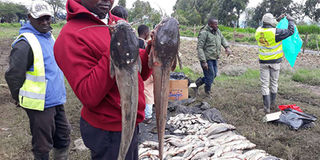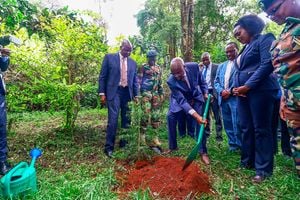Feedback: Why you should keep catfish

A man displays catfish for sale in Naivasha. The Kenya catfish can grow in all climatic conditions unlike Nile tilapia whose growth is challenged in areas with very low temperature. FILE PHOTO | NMG
What you need to know:
- The Kenya catfish can grow in all climatic conditions unlike Nile tilapia whose growth is challenged in areas with very low temperature.
- You can enquire more on hanging pond by contacting or visiting your nearest fisheries department.
- Napier grass is established largely through vegetative materials either stem cuttings (cane cuttings) or root splits. It is one of the best species for fodder due to high yields.
- Other attributes include but not limited to disease resistance.
WHY CATFISH IS AS GOOD AS TILAPIA
I am an extension officer promoting aquaculture in the western belt. Kindly sensitise the public on need to grow African catfish apart from the common Nile tilapia.
Josiah
I experience similar case in Nakuru County, where farmers have shunned Africa catfish. The public should understand that this fish is as sweet as tilapia.
African catfish has also other special attributes making it superior to Nile tilapia. The fish can tolerate issues of water quality like low oxygen compared to Nile tilapia.
The Kenya catfish can grow in all climatic conditions unlike Nile tilapia whose growth is challenged in areas with very low temperature.
Catfish has low bone content compared to Nile tilapia. In semi-intensive aquaculture feeding, African catfish is very cheap compared to Nile tilapia.
Finally, African catfish has faster growth rate and grows to heavy weights of up to 5kg unlike Nile tilapia. I would, therefore, urge farmers to consider introducing catfish on their farms.
In Nakuru County, we are promoting catfish farming using hanging/raised ponds, which can also act as kitchen pond where a farmer keeps up to 200 catfish for family food security.
You can enquire more on hanging pond by contacting or visiting your nearest fisheries department. For more clarification on hanging pond and catfish farming, write to [email protected]
Alex Akidiva, AgroScience Park, Fish farm, Egerton University.
****
GROWING BEANS AND SUKUMA WIKI
I am Emmanuel, an animal science student at Maseno University and I would like to know various issues. First, I would like to plant beans, thus, what are the best pesticides to use on the crop.
Second, I am planning to plant sukuma wiki and I'd like advice on the best breed of vegetables to plant.
Some of the common bean pests include:
Root knot nematodes (Meloidogyne spp): They attack roots causing lesions, root galls or swellings, plant stunting and wilting of severely infected plants. The lesions also serve as entry points for bacteria and fungi. Affected plants are dwarfed and have distorted leaves.
Control: Crop rotation, good weed control to remove weeds, which are also hosts to the nematodes, fallowing infested fields and use of soil fumigation with nemacur.
Bean fly (Ophiomyia spp; Phorbia ssp): The adult is a small two-winged inset that can be seen resting on leaves where it lays the eggs. The damage is caused by the larvae, which mine the stem. The larvae also feed on the cotyledons of seedlings before or after emergence. Affected plants are yellow, stunted, and stems are cracked at the soil level.
Control: Seed treatment with imidacloprid, chemical sprays with Karate and soil treatment with Triazophos.
Bean thrips (Megalothrips spp): Damage is caused by nymphs and adults that feed and puncture flower structures and young pods.
Control: Before flowering, foliar sprays using Diazinon starting from two leaf stage; during flowering, with Karate, Decis or ambush CY.
There are many varieties of sukuma wiki including Thousand headed, Collards, Marrow stem, Collard Mfalme F1 and Sukuma Siku hybrid.
The Thousand headed has small leaves, grows slowly compared to other varieties and has a long harvesting time.
Collards is tolerant to drought, grows faster and it produces large, tender, bluish green leaves.
Sukuma Siku hybrid produces curled soft leaves and is tolerant to diamond back moth.
Collard Mfalme F1 is tolerant to many diseases, has short internodes and many tender leaves per internode thus high yield per unit area.
Marrow Stem produces dark green leaves with less fibre and has a good flavour. It does well in cool climates with fairly heavy and well-distributed rainfall.
Carol Mutua,
Department of Crops, Horticulture, and Soils, Egerton University.
****
POOR FISH GROWTH
I am a farmer in Bondo rearing tilapia. One of the challenges I am facing is that my fish is not growing as big as I expect. Can it be that I stocked a poor breed?
Onyango
It might be true that you are having a wrong breed. However, the growth of fish is influenced by an array of factors.
These include genetic make-up/breed (source of your fingerlings), environmental factors (such as temperature, oxygen concentration, salinity, and pH among other physico-chemical properties of water) and feeds/nutrition.
You have to understand that there are different strains of tilapia occurring within the tropics. Nile tilapia is the most suitable candidate in aquaculture.
You should, therefore, be keen on the source of your fingerlings. Can you trace their origin (hatchery)? Finally, feeds consume up to 40-50 per cent of the overall production cost.
You have to ensure you are giving the fish quality feeds taking care not to underfeed or overfeed. For more clarification, write to [email protected]
Alex Akidiva, AgroScience Park Fish Farm, Egerton University.
****
LAUNCHING A DAIRY PROJECT
We are yet to roll out a new project that will support dairy farmers in western Kenya, therefore, we need a reliable and experienced expert that can be contracted to train and develop extension materials for farmers.
Dr Smith W, Project coordinator
As The Udder Agribusiness, we focus on linking research with dairy farming and agribusiness through pioneering a knowledge-based farming approach.
We disseminate dairy research information to farmers through practical dairy farmer trainings, developing competence-based dairy short courses curriculum, developing dairy modules and fact sheets.
We mostly provide these services to development and research projects, dairy farmers and co-operatives, private corporate and government institutions.
Most of our extension articles, written with much needed scientific facts and precision in a way that ‘speaks to the farmer,’ get published in Seeds of Gold.
We also work with like-minded organisations towards engaging more youths in agriculture through networking. You can visit us at CoELIB offices in Egerton University or email me on [email protected]
Felix Akatch Opinya, Team leader — The Udder Agribiss, Department of Animal Science, Egerton University.
****
NAPIER GRASS SEEDS
I am a resident of Nakuru County and currently residing in Mombasa. I would really like you to enlighten me on where I can get high quality napier grass seeds. I have one-and-a-half acres that I want to grow the fodder.
Kamau
Napier grass is established largely through vegetative materials either stem cuttings (cane cuttings) or root splits. It is one of the best species for fodder due to high yields.
Although you didn’t mention whether you want the said variety for planting in Mombasa or Nakuru, however, one of the highest yielding and widely adapted varieties is Kakamega 1.
Other attributes include but not limited to disease resistance. Note that there are two methods of planting napier grass, that is conventional method and “tumbukiza” method. The latter gives almost double the yield.
Tom C. Owino,
Department of Crops, Horticulture, and Soils, Egerton University.
****
FARMING HERBS AND SPICES ON 450 ACRES
I have family land in Kwale totalling 450 acres with enough water on part of it. It is a virgin land with natural grass and scattered mango, coconut and cashew nut trees.
We are looking for a partner who can develop this farmland growing any crops that have high yields and attractive market prices.
Our idea is to grow on part of the land herbs and spices that can be exported. Also crops that we can add value after processing for exports. I look forward to hear from your experts.
Sudhir
Herbs and spices production needs horticultural experts and I would direct you to one of them within the coastal region. His contact is 0721205576.
Peter Caleb Otieno,
Department of Crops, Horticulture and soils, Egerton University.





